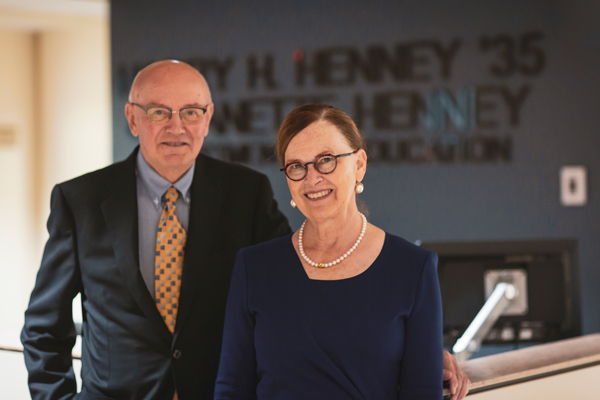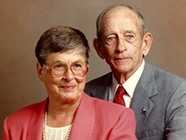
Henney Department of Education is ‘game changer’ for teaching program at Manchester University
Manchester University is moving forward with a bold plan to prepare the next generation of teachers.
It celebrated “a game changer” this month when it dedicated the Harry H. Henney ’35 and Jeanette Henney Department of Education.
The named department is a gift from Dr. Jane Henney and her husband Dr. Robert Graham. Jane Henney, a Woodburn, Ind., native and 1969 Manchester alumna, was the first woman to serve as commissioner of the U.S. Food and Drug Administration.
The gift “is a game changer,” said Professor Heather Schilling, Education Department chair and director of the Teacher Education Program at MU.
Henney’s action “is exponentially increasing the impact of our program,” said Schilling. “Her vision and belief in the work we do empowers education majors, and her gift allows our program to consider opportunities we could not previously afford.”
Schilling said the gift could be used in a number of ways:
- A fellowship for a current classroom teacher who would consult with the department on its curriculum, keeping it current, as well as teach a methods course.
- Offer students more focused clinical experiences, perhaps for field trips or extended stays. Financially, this will provide for transportation and related expenses with the ultimate goal of providing authentic learning experiences for Manchester undergraduates.
- Allow the department to collaborate in creative ways with exemplary classrooms, providing access to materials and services that will enhance authentic learning experiences for both students in preschool through high school, and undergraduates in the Manchester program
The support might also be used for research, off-campus study, trauma-informed teaching, methods and practice of progressive education, and exploration of ethics, social justice and civil rights in education.

Jane Henney’s father, Harry, was a lifelong educator, primarily at Woodburn and later at Woodlan High School in Woodburn. Her mother, Jeanette, was a professional secretary who worked many years in the East Allen County Schools. Jeanette dreamed of becoming a teacher, but the Great Depression left her family without the resources to send her to college.
“When it became clear that college was not in the cards for her, she redirected her dream to her children,” Jane Henney said of her mother. “None of us had any doubt that she would do anything possible to see that we had that opportunity.”
When Jane Henney was accepted into medical school but lacked the means to pay for it, “it was Mom who emptied her funds, saved for a rainy day, and told me she would see that I was able to go.”
Henney later reimbursed her mother, but said, “In many ways, no amount will ever be sufficient to repay what both my mom and dad provided: a strong set of values, a work ethic, a desire to serve and a commitment to the community.”
She added that the endowment for the Henney Department of Education will “honor my parents’ deep commitment to educating those who are called to the noble profession of teaching.”
Jane Henney and Robert Graham have long supported programs at Manchester. The endowment for the department began several years ago as a gift to sponsor a yearly lecture at the University. The two also made a generous donation that allowed the University to name the
Emerson and Evelyn Niswander Department of Biology.
“We have the opportunity to lift up a profession – teaching and educating – that fulfills Manchester’s mission of graduating persons of ability and conviction who improve the human condition,” said Manchester President Dave McFadden.
For the mediaFor more information, contact Heather Schilling, HASchilling@manchester.edu
About Manchester
With campuses in North Manchester and Fort Wayne, Ind., Manchester University offers more than 70 areas of academic study to about 1,400 students in undergraduate programs,a Master of Accountancy, a Master of Science in pharmacogenomics, a Master of Athletic Training a four-year professional Doctor of Pharmacy degree and a four-year dual degree in pharmacy and pharmacogenomics. Learn more about the private, northern Indiana school at www.manchester.edu.
Our mission
Manchester University respects the infinite worth of every individual and graduates persons of ability and conviction who draw upon their education and faith to lead principled, productive, and compassionate lives that improve the human condition.
September 2019